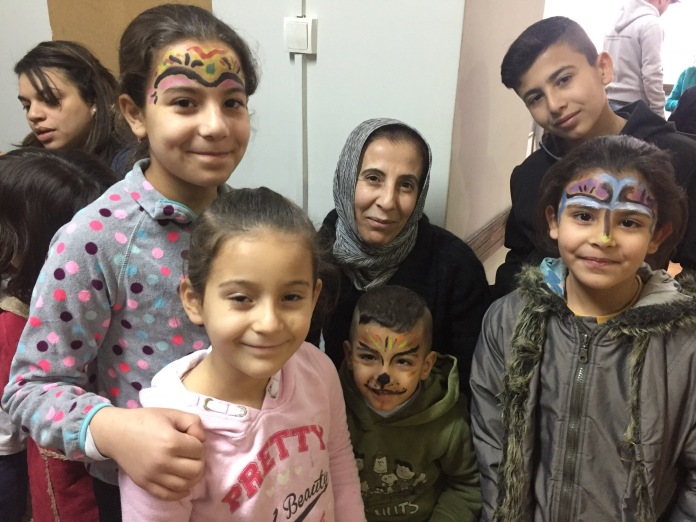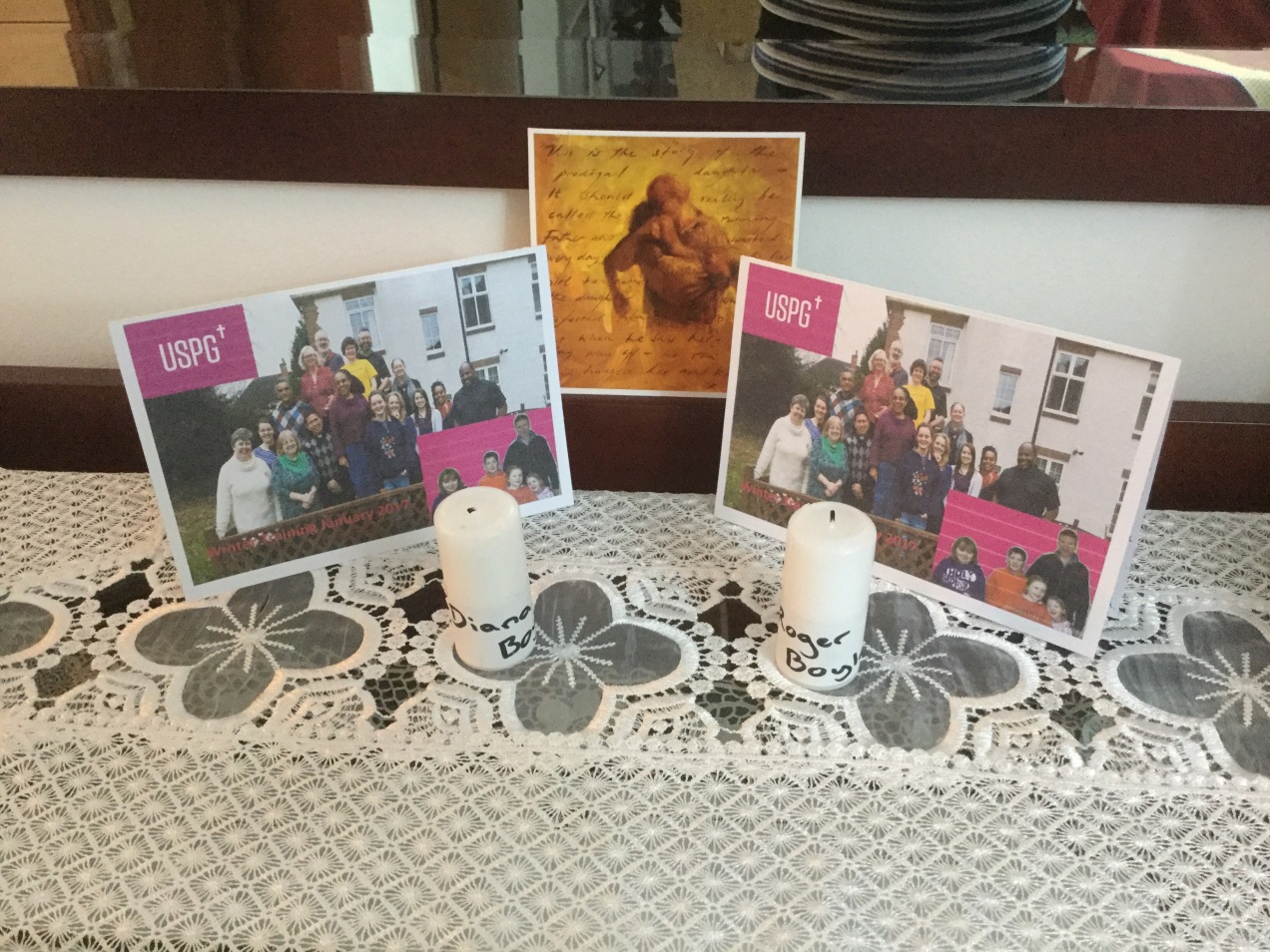Since I last blogged, we’ve continued our work with the Salvation Army. It’s very much settled into a routine of what we give out on a particular day, so hopefully this helps the clients we seek to serve, as well as giving the staff and volunteers a greater expectation of what we’re going to doing. We’ve now started re-registering our clients, in order to see how they’re doing and ensure that they are still here and eligible for service. Some we haven’t seen for ages, so perhaps they either don’t need our service anymore, have left to be reunited with other family members elsewhere or been sent back to Turkey or their homeland. We’ve no way of knowing as they don’t come and say goodbye.
Just this week three people that I’ve interviewed have had harrowing stories. One woman told me that her 8 year old daughter had died at some point during the last 3 months. Unfortunately I didn’t find out much more, as my interpreter was unable to understand the questions I wanted to ask. Another male from Syria, told me that he was in Greece with his wife and four children. He had a son in Germany and a married daughter of 22 still in Syria. When I asked whether his daughter was safe, he told me that she wasn’t. At least once a week she has to shelter from aircraft dropping bombs and he feared for her safety. I know how much I worry about Jack and Polly, our children, who are safely working in England, and can’t image how that man manages. Another woman from Afghanistan who had fled via Iran to Greece, told me that her 18 year old brother had just died. Apparently he had died in Syria. When I asked what he was doing in Syria, I was told that Iran sent young Afghanistan males to war in Syria. Such terrible stories, that are retold in a matter of fact way.
This pain is off set by seeing some of the other refugees who are so glad to be here and to be safe. There is a particular family with six children who bring joy wherever they go. We’ve had the pleasure of volunteers being at the day centre playing with the children, and they’ve had a lovely time making bracelets, applying nail varnish, colouring and face painting. The children were so excited by the crafting and their joy was shared around. Now every time that I see the girls, they run up to me, give me a hug, and tell me they love me. They always come to say goodbye and give me another hug.
 Aside from being at the day centre, we’ve also been involved in other groups serving the refugees. We’ve done tea and sandwiches a few more times, and been and helped our friend Kerrie at Hope Cafe. Kerrie is working here as an independent person and is doing fantastic work supporting refugees and Greek nationals by supplying food packages, non food items and what ever else is needed at a particular time. She has the advantage of being independent, and small, so can quickly change course when circumstances change. An example of this is when refugees came to see her explaining that they were to be relocated to other EU countries and needed a suitcase. Kerrie just went out and bought some. She is doing remarkable things and is currently changing course again to establish her cafe.
Aside from being at the day centre, we’ve also been involved in other groups serving the refugees. We’ve done tea and sandwiches a few more times, and been and helped our friend Kerrie at Hope Cafe. Kerrie is working here as an independent person and is doing fantastic work supporting refugees and Greek nationals by supplying food packages, non food items and what ever else is needed at a particular time. She has the advantage of being independent, and small, so can quickly change course when circumstances change. An example of this is when refugees came to see her explaining that they were to be relocated to other EU countries and needed a suitcase. Kerrie just went out and bought some. She is doing remarkable things and is currently changing course again to establish her cafe.
We’ve had the opportunity to visit one of the refugee camps at Oinofyta. We were welcomed to the site and spoke to some Afghan residents. In general the refugees are happy to practice their English on us, and to find out about where we’re from and answer questions about themselves. The camp is set in a disused factory building and the majority of the residents reside in the building. There are still a few tents and some are occupied by mostly young men, who choose to be in the tents. I think that the tents are quieter with a bit more privacy. The camp houses about 600 refugees and the staff, mostly volunteers, do their best to ensure that the refugees have things to do including a sewing workshop which is run as a business, a garden and a workshop where refugees can make items of furniture for their rooms. There is also school for the children and language classes for all. It is clear that these camps are going to be here for some time to come, so it is important that there are lots of things for the asylum seekers to do so that they can be purposeful and learn new skills.
We’ve also attended a few meetings. We went to the UNHCR meeting which was interesting to see which organisations are working in Greece and what is being done. The statistics about the number of refugees is startling, but there is a lot of work being done to try and administer the applications and then settle those that are allowed to stay. We asked about the non food item ban that we’ve been informed about, and there seemed to be a lot less worry about this, and the thought that this would be watered down, if not abandoned altogether. None of the other NGO’s appeared to be worried about this at all. I’ve been to a practitioners meeting which was interesting, and also the Churches Together in Athens meeting which was inspirational. It was fantastic to meet so many other Christian groups in Athens who are helping by hosting, and providing services to refugees.
Away from our volunteer work, we’ve enjoyed taking part in some aspects of Greek life. We’ve been out to the countryside to have lunch with Deacon Chris and her husband Cliff, seen the celebration marches for Greek Independence Day, which involved military parades with the armed forces being clapped and cheered. (It seemed that the bigger the tank, the louder the clapping and cheering was.) We’ve visited the 2004 Olympic site which is a ghost town now, but with very impressive buildings. We’ve been to the birthday party of one of our colleague volunteers, and last weekend we hired a car and went to visit the Temple of Poseidon. A lovely day out and a beautiful spot at the southernmost point of the Greek mainland. The driving in Athens wasn’t much fun for Roger though.
 We’re now nearing the end of our time with the Salvation Army and so are beginning to transition ourselves out. On 17th April Roger and I are heading to the island of Lesvos to spend a week working with Lighthouse Relief. They run the camp on Lesvos, carry out a 24h hour a day boat watch, meet any boats that arrive from Turkey and also run an eco project. They are using volunteers to recover abandoned boats and life jackets from the coast. These get cut up and taken back to the camp. At the camp the asylum seekers have set up a sewing workshop where they make items out of the recycled boats and life jackets which they then sell. A fantastic project that will no doubt be giving them some purpose in the extended period that they have to wait for a decision from the Greek Asylum Service. We are looking forward to this time, and to compare what we’ve seen and learnt in Athens with what occurs on Lesvos.
We’re now nearing the end of our time with the Salvation Army and so are beginning to transition ourselves out. On 17th April Roger and I are heading to the island of Lesvos to spend a week working with Lighthouse Relief. They run the camp on Lesvos, carry out a 24h hour a day boat watch, meet any boats that arrive from Turkey and also run an eco project. They are using volunteers to recover abandoned boats and life jackets from the coast. These get cut up and taken back to the camp. At the camp the asylum seekers have set up a sewing workshop where they make items out of the recycled boats and life jackets which they then sell. A fantastic project that will no doubt be giving them some purpose in the extended period that they have to wait for a decision from the Greek Asylum Service. We are looking forward to this time, and to compare what we’ve seen and learnt in Athens with what occurs on Lesvos.
There are still so many problems her in Greece and in Athens, and so many people in need. We would value your prayers for all the asylum seekers in Athens, particularly those that seem to be suffering so much with death and loss, even when they thought that by leaving their homeland they had escaped this. Also for the Salvation Army in Athens as they move forward, and that our leaving is seamless with others coming in. We’d also welcome your prayers for our time in Lesvos and our travel there and back.








